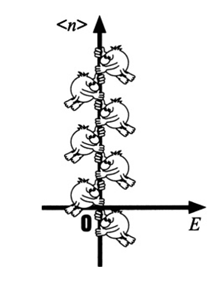


 الفيزياء الكلاسيكية
الفيزياء الكلاسيكية
 الكهربائية والمغناطيسية
الكهربائية والمغناطيسية
 علم البصريات
علم البصريات
 الفيزياء الحديثة
الفيزياء الحديثة
 النظرية النسبية
النظرية النسبية
 الفيزياء النووية
الفيزياء النووية
 فيزياء الحالة الصلبة
فيزياء الحالة الصلبة
 الليزر
الليزر
 علم الفلك
علم الفلك
 المجموعة الشمسية
المجموعة الشمسية
 الطاقة البديلة
الطاقة البديلة
 الفيزياء والعلوم الأخرى
الفيزياء والعلوم الأخرى
 مواضيع عامة في الفيزياء
مواضيع عامة في الفيزياء|
Read More
Date: 19-8-2016
Date: 19-8-2016
Date: 9-8-2016
|
Bose Condensation
Consider Bose condensation for an arbitrary dispersion law in D dimensions (see Figure 1.1). Assume a relation between energy and momentum of the form 
 Find a relation between D and σ for Bose condensation to occur.
Find a relation between D and σ for Bose condensation to occur.


Figure 1.1
SOLUTION
For Bose particles,

 (1)
(1)
where τ is the temperature in energy units. The total number of particles in a Bose distribution is

 (2)
(2)
Substituting  into the integral gives
into the integral gives

 (3)
(3)
The condition for Bose condensation to occur is that, at some particular temperature, the chemical potential goes to zero. Then the number of particles outside the Bose condensate will be determined by the integral

 (4)
(4)
This integral should converge since N is a given number. Expanding around x = 0 in order to determine conditions for convergence of the integral yields

 (5)
(5)
So, this integral diverges at D/σ ≤ 1, and there is no Bose condensation for this region. (For instance, in two dimensions, particles with ordinary dispersion law E = p2/2m would not Bose-condense.) In three dimensions, D/σ = 3/2 > 1, so that Bose condensation does occur.



|
|
|
|
دخلت غرفة فنسيت ماذا تريد من داخلها.. خبير يفسر الحالة
|
|
|
|
|
|
|
ثورة طبية.. ابتكار أصغر جهاز لتنظيم ضربات القلب في العالم
|
|
|
|
|
|
|
سماحة السيد الصافي يؤكد ضرورة تعريف المجتمعات بأهمية مبادئ أهل البيت (عليهم السلام) في إيجاد حلول للمشاكل الاجتماعية
|
|
|